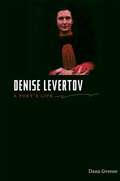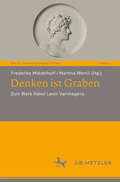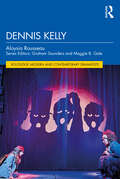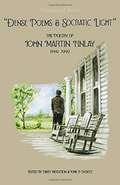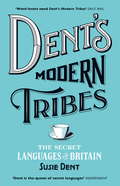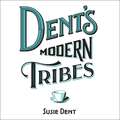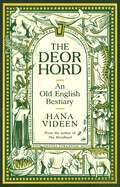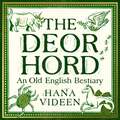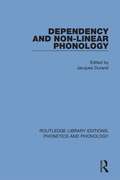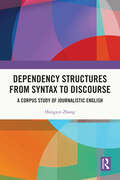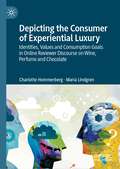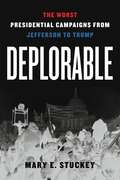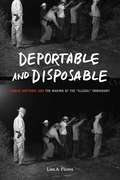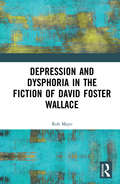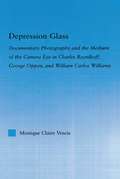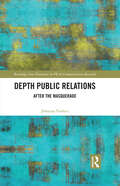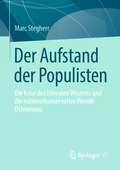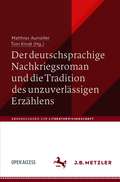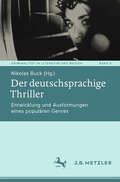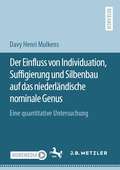- Table View
- List View
Denise Levertov: A Poet's Life
by Dana GreeneKenneth Rexroth called Denise Levertov (1923-1997) "the most subtly skillful poet of her generation, the most profound, . . . and the most moving." Author of twenty-four volumes of poetry, four books of essays, and several translations, Levertov became a lauded and honored poet. Born in England, she published her first book of poems at age twenty-three, but it was not until she married and came to the United States in 1948 that she found her poetic voice, helped by the likes of William Carlos Williams, Robert Duncan, and Robert Creeley. Shortly before her death in 1997, the woman who claimed no country as home was nominated to be America's poet laureate. Levertov was the quintessential romantic. She wanted to live vividly, intensely, passionately, and on a grand scale. She wanted the persistence of Cézanne and the depth and generosity of Rilke. Once she acclimated herself to America, the dreamy lyric poetry of her early years gave way to the joy and wonder of ordinary life. By the late 1960s and early 1970s, however, her poems began to engage the issues of her times. Vehement and strident, her poetry of protest was both acclaimed and criticized. The end of both the Vietnam War and her marriage left her mentally fatigued and emotionally fragile, but gradually, over the span of a decade, she emerged with new energy. The crystalline and luminous poetry of her last years stands as final witness to a lifetime of searching for the mystery embedded in life itself. Through all the vagaries of life and art, her response was that of a "primary wonder." In this illuminating biography, Dana Greene examines Levertov's interviews, essays, and self-revelatory poetry to discern the conflict and torment she both endured and created in her attempts to deal with her own psyche, her relationships with family, friends, lovers, colleagues, and the times in which she lived. Denise Levertov: A Poet's Life is the first complete biography of Levertov, a woman who claimed she did not want a biography, insisting that it was her work that she hoped would endure. And yet she confessed that her poetry in its various forms--lyric, political, natural, and religious--derived from her life experience. Although a substantial body of criticism has established Levertov as a major poet of the later twentieth century, this volume represents the first attempt to set her poetry within the framework of her often tumultuous life.
Denken ist Graben: Zum Werk Rahel Levin Varnhagens (Neue Romantikforschung #6)
by Frederike Middelhoff Martina WernliDie Schriften Rahel Levin Varnhagens (1771–1833) sind ästhetisch und thematisch komplex. Sie umfassen kleine Formen, u.a. Aphorismen und Lektürereflexionen, ebenso wie lange Tagebucheinträge und umfangreiche Briefwechsel mit beinahe dreihundert Personen. Auszüge ihrer Texte wurden bereits zur Lebzeit Levin Varnhagens publiziert. Die im vorliegenden Band versammelten Beiträge zielen darauf ab, Rahel Levin Varnhagens Texte sowie die damit verknüpften weitreichenden Lektüren und Kontexte in ihren materiellen, ästhetischen, poetologischen und soziohistorischen Dimensionen zu erkunden und vor dem Hintergrund romantischer Konzepte und epistolarer Kommunikationsformen zu diskutieren. Darüber hinaus gibt der Band Einblick in ausgewählte Handschriften (Tagebuch A) sowie in ein bislang unpubliziertes Ausgabenbuch der Romantikerin.
Dennis Kelly (Routledge Modern and Contemporary Dramatists)
by Aloysia RousseauDennis Kelly explores Kelly’s unusual career path and sheds light on his eclectic approach to the arts, characterised by a refusal to write texts that people can fit within neat categories. This is the first monograph on Kelly’s work for stage and screen and brings to light his essential contribution to contemporary British drama and his huge range of work including his rise to international fame with Matilda the Musical.Drawing on Kelly’s published and unpublished texts, his work in production, reviews, original interviews with directors, actors and with Kelly himself as well as critical theory, Dennis Kelly examines and reappraises key motifs in his work such as his preoccupation with violence, the complex relationship between the individual and the community or his emphasis on storytelling. It also offers new insights into overlooked aspects of Kelly’s work by setting out to explore his traumatic narratives and his post-romanticism. In keeping with Kelly’s wish never to repeat himself, this study offers multiple critical entries into his plays, television series and films, drawing on moral and political philosophy, trauma studies, studies in humour, feminist theory and film studies.Part of the Routledge Modern and Contemporary Dramatist series, Dennis Kelly is addressed to students and scholars in Drama, Theatre and Performance as well as theatre practitioners and offers in-depth analysis of one of the most unique and challenging voices in contemporary British playwriting and screenwriting.
Dense Poems and Socratic Light: The Poems of John Martin Finlay
by John Martin Finlay David Middleton John P DoucetThis Wiseblood Book edition of Finlay’s poetry and related writings is the most comprehensive edition to date, including many previously uncollected and unpublished materials. John Finlay’s poems are almost all in traditional literary forms. Whether plain-style, narrative, or post-symbolist, Finlay’s poems are serious, simple, deep, direct, and often traumatically revealing of the human condition. The best of them are truly unforgettable. <p><p> Finlay addresses such subjects as the origin of the mind, the relation of mind and matter, mind and the irrational, mind and God, the nature of evil, Thomistic theology, philosophical subjectivism, the inscrutability and beauty of the natural world, primitive religious rituals, and, especially in the later poems, family life in the South since the early nineteenth century, Indian life in the South, the nature of modern war, and the isolation of the serious thinker and artist in the contemporary world. <p> Readers who want serious poems that vividly present sensuous experience as understood by a mature mind steeped in classical and Christian tradition, yet fully aware of the problems of the contemporary world and of the perpetual threat of the primitive and the irrational, should find much here to contemplate. In their severe and uncompromising grandeur John Finlay’s best poems are surely permanent additions to American literature.
Dent's Modern Tribes: The Secret Languages of Britain
by Susie DentDid you know that . . . a soldier's biggest social blunder is called jack brew - making yourself a cuppa without making one for anyone else? That twitchers have an expression for a bird that can't be identified - LBJ (the letters stand for Little Brown Job)? Or that builders call plastering the ceiling doing Lionel Richie's dancefloor? Susie Dent does.Ever wondered why football managers all speak the same way, what a cabbie calls the Houses of Parliament, or how ticket inspectors discreetly request back-up? We are surrounded by hundreds of tribes, each speaking their own distinct slanguage of colourful words, jokes and phrases, honed through years of conversations on the battlefield, in A&E, backstage, or at ten-thousand feet in the air. Susie Dent has spent years interviewing hundreds of professionals, hobbyists and enthusiasts, and the result is an idiosyncratic phrasebook like no other. From the Freemason's handshake to the publican's banter, Dent's Modern Tribes takes us on a whirlwind tour of Britain, decoding its secret languages and, in the process, finds out what really makes us all tick.
Dent's Modern Tribes: The Secret Languages of Britain
by Susie DentDid you know that . . . a soldier's biggest social blunder is called jack brew - making yourself a cuppa without making one for anyone else? That twitchers have an expression for a bird that can't be identified - LBJ (the letters stand for Little Brown Job)? Or that builders call plastering the ceiling doing Lionel Richie's dancefloor? Susie Dent does.Ever wondered why football managers all speak the same way, what a cabbie calls the Houses of Parliament, or how ticket inspectors discreetly request back-up? We are surrounded by hundreds of tribes, each speaking their own distinct slanguage of colourful words, jokes and phrases, honed through years of conversations on the battlefield, in A&E, backstage, or at ten-thousand feet in the air. Susie Dent has spent years interviewing hundreds of professionals, hobbyists and enthusiasts, and the result is an idiosyncratic phrasebook like no other. From the Freemason's handshake to the publican's banter, Dent's Modern Tribes takes us on a whirlwind tour of Britain, decoding its secret languages and, in the process, finds out what really makes us all tick.
Dent's Modern Tribes: The Secret Languages of Britain
by Susie DentDid you know that . . . a soldier's biggest social blunder is called jack brew - making yourself a cuppa without making one for anyone else? That twitchers have an expression for a bird that can't be identified - LBJ (the letters stand for Little Brown Job)? Or that builders call plastering the ceiling doing Lionel Richie's dancefloor? Susie Dent does.Ever wondered why football managers all speak the same way, what a cabbie calls the Houses of Parliament, or how ticket inspectors discreetly request back-up? We are surrounded by hundreds of tribes, each speaking their own distinct slanguage of colourful words, jokes and phrases, honed through years of conversations on the battlefield, in A&E, backstage, or at ten-thousand feet in the air. Susie Dent has spent years interviewing hundreds of professionals, hobbyists and enthusiasts, and the result is an idiosyncratic phrasebook like no other. From the Freemason's handshake to the publican's banter, Dent's Modern Tribes takes us on a whirlwind tour of Britain, decoding its secret languages and, in the process, finds out what really makes us all tick.(P)2016 John Murray Press
Deontic Logic and Legal Systems
by Pablo E. Navarro Jorge L. RodrÍguez Eugenio Bulygin Pablo E. Navarro Jorge L. RodríguezA considerable number of books and papers have analyzed normative concepts using new techniques developed by logicians; however, few have bridged the gap between the Continental (i. e. , European) and Latin American traditions in legal philosophy. This book addresses this issue by offering an introductory study on the many possibilities that logical analysis offers the study of legal systems. The volume is divided into two sections: The first covers the basic aspects of classical and deontic logic and its connections, advancing an explanation of the most important topics of the discipline by comparing different systems of deontic logic and exploring some of the most important paradoxes in its domain. The second section deals with the role of logic in the analysis of legal systems by discussing in what sense deontic logic and the logic of norm-propositions are useful tools for a proper understanding of the systematic structure of law. Arguments are provided to stress the relevance of a systematic reconstruction of law as a necessary step in the identification of the truth conditions of legal statements and the reasons for accepting or rejecting the validity of logical consequences of enacted legal norms.
The Deorhord: An Old English Bestiary
by Hana VideenAn entertaining tour of Old English words for animals, from the author of The Wordhord: Daily Life in Old English, which Neil Gaiman called &“a marvelous book&”Many of the animals we encounter in everyday life, from pets and farm animals to the wild creatures of field and forest, have remained the same since medieval times. But the words used to name and describe them have often changed beyond recognition, starting with the Old English word for &“animal&” itself, deor (pronounced DAY-or). In The Deorhord, Hana Videen presents a glittering Old English bestiary of animals real and imaginary, big and small, ordinary and extraordinary—the good, the bad, and the downright baffling.From gange-wæfran or walker-weavers (spiders) and hasu-padan or grey-cloaked ones (eagles) to heafdu swelce mona or moon-heads (historians still don&’t know!), The Deorhord introduces a world both familiar and strange: where ants could be monsters and panthers could be your friends, where dog-headed men were as real as elephants, and where whales were as sneaky as wolves. The curious stories behind these words provide vivid insights into the language, literature, and lives of those who spoke Old English—the language of Beowulf—more than a thousand years ago.A delightful journey through the weird and wonderful world of Old English, The Deorhord is a magical menagerie of new creatures and new words for the modern englisc reader to discover.
The Deorhord: An Old English Bestiary
by Hana VideenMany of the animals we encounter in everyday life, from the creatures in our fields to those in our fantasies, have remained the same since medieval times - but the words we use, and the ways we describe them, have often changed beyond recognition...Old English was spoken over a thousand years ago, when every animal was a deor. In this glittering Old English bestiary we find deors big and small, the ordinary and the extraordinary, the good, the bad and the downright baffling. From walker-weavers (spiders) and grey-cloaked ones (eagles) to moon-heads and teeth-tyrants (historians still don't know!), we discover a world both familiar and strange: where ants could be monsters and panthers could be your friend, where dog-headed men were as real as elephants and where whales were as sneaky as wolves.From the author of The Wordhord comes another delightful dive into the realm of Old English - words and creatures that will change the way you see the world.
Dependency and Non-Linear Phonology (Routledge Library Editions: Phonetics and Phonology #5)
by UnknownFirst published in 1986. The purpose of this collection of articles is to explore in depth the notational model dependency phonology, and also to offer rival, non-dependency-based accounts of aspects of suprasegmental and intrasegmental structure. Dependency and Non-Linear Phonology offers an introduction to dependency phonology that does not presuppose any knowledge of this framework and points out some of the major differences between dependency phonology and competing systems of representations. The book will also act as a guide to current debates in the field of ‘non-linear’ phonology.
Dependency Structures from Syntax to Discourse: A Corpus Study of Journalistic English
by Hongxin ZHANGBased on the large corpora of journalistic English, this title examines dependency relations and related properties at both syntactic and discourse levels, seeking to unravel the language patterns of real-life usage. With a focus on rank-frequency distribution, the author investigates the distribution of linguistic properties/units from the perspectives of properties, motifs and sequencings. At the syntactic level, the book analyses the following three dimensions: various combinations of a complete dependency structure, valency and dependency distance. At the discourse level, it proves that the elements can also form dependency relations by exploring (1) the rank-frequency distribution of Rhetorical Structure Theory relations, their motifs, discourse valency and discourse dependency distance; (2) whether there is top-down organisation or an inverted pyramid structure at all the three discourse levels; and (3) whether discourse dependency distances and valencies are lawfully distributed, following the same distribution patterns as those at the syntactic level. This book will be of great value for scholars and students of quantitative linguistics and computational linguistics and its practical insights will also benefit professionals of language teaching and journalistic writing.
Depersonalization and Creative Writing: Unreal City (Routledge Studies in Creative Writing)
by Matthew FrancisDepersonalization and Creative Writing: Unreal City explores the common psychological symptom of depersonalization, its influence on literature and the insights it can provide into the writing process. Depersonalization is a distressing symptom in which sufferers feel detached from their own selves and the world. Often associated with psychological disorders, it can also affect healthy people at times of stress. Beginning with a first-hand account of the experience, the book goes on to argue that many well-known literary texts, including Camus’s The Outsider and Sartre’s Nausea, evoke a similar psychological state. It shows how a concept of depersonalized writing can be found in the work of literary theorists from widely different traditions, including T.S. Eliot, Roland Barthes and Viktor Shklovsky. Finally, it maintains that creative writers can make use of the lessons learned from a study of depersonalization to arrive at a deeper understanding of writing. Given this knowledge, the controversial writing teacher’s maxim show, don’t tell, so often misapplied or misunderstood, can be repurposed as a practical instruction for taking students’ writing to a new level of sophistication and wisdom.
Depicting the Consumer of Experiential Luxury: Identities, Values and Consumption Goals in Online Reviewer Discourse on Wine, Perfume and Chocolate
by Charlotte Hommerberg Maria LindgrenThis book sheds light on the addressees of online reviewer discourse on wine, perfume and chocolate in order to explore how the discourse construes the consumer of experiential luxury. In the 21st century, luxury is more complex than ever before. Luxury products have become more affordable and hence accessible to new markets and consumer segments, and the groups of consumers seeking luxury experiences are more heterogeneous than ever. Yet, consumption choices as well as how these are thought about, evaluated and talked about still function to position consumers with respect to both how they see themselves and how they want others to see them. Many consumers seek to consume in subtle and sophisticated ways. They strive to develop consumption expertise with a view to maximizing their enjoyment from the luxury experience, avoiding overt displays of wealth while signalling status by means of luxury insight only available to the cognoscenti. One way for aficionados to develop their insight into the diversified and elusive realm of contemporary luxury is to engage with online reviewer discourse. The authors take a discourse analytic approach informed by the Appraisal model to expose the imagined addressees’ characteristics and behaviour, the luxury values they embrace and the goals of their luxury consumption. The authors argue that the activity of online reviewers is such a crucial arena in contemporary luxury that a new form of luxury consumption has emerged, which they label review-based luxury. This book will be of interest to students and academics in the fields of Linguistics, Discourse Analysis, Communication, Argumentation, Media Studies and Marketing, as well as anyone with a general interest in wine, perfume and chocolate as experiential luxury.
Deplorable: The Worst Presidential Campaigns from Jefferson to Trump
by Mary E. StuckeyPolitical campaigns in the United States, especially those for the presidency, can be nasty—very nasty. And while we would like to believe that the 2020 election was an aberration, insults, invective, and yes, even violence have characterized US electoral politics since the republic’s early days. By examining the political discourse around nine particularly deplorable elections, Mary E. Stuckey seeks to explain why. From the contest that pitted Thomas Jefferson against John Adams in 1800 through 2020’s vicious, chaotic matchup between Donald Trump and Joe Biden, Stuckey documents the cycle of despicable discourse in presidential campaigns. Looking beyond the character and the ideology of the candidates, Stuckey explores the broader political, economic, and cultural milieus in which each took place. In doing so, she reveals the conditions that exacerbate and enable our worst political instincts, producing discourses that incite factions, target members of the polity, encourage undemocratic policy, and actively work against the national democratic project.Keenly analytical and compulsively readable, Deplorable provides context for the 2016 and 2020 elections, revealing them as part of a cyclical—and perhaps downward-spiraling—pattern in American politics. Deplorable offers more than a comparison of the worst of our elections. It helps us understand these shameful and disappointing moments in our political history, leaving one important question: Can we avoid them in the future?
Deplorable: The Worst Presidential Campaigns from Jefferson to Trump
by Mary E. StuckeyPolitical campaigns in the United States, especially those for the presidency, can be nasty—very nasty. And while we would like to believe that the 2020 election was an aberration, insults, invective, and yes, even violence have characterized US electoral politics since the republic’s early days. By examining the political discourse around nine particularly deplorable elections, Mary E. Stuckey seeks to explain why. From the contest that pitted Thomas Jefferson against John Adams in 1800 through 2020’s vicious, chaotic matchup between Donald Trump and Joe Biden, Stuckey documents the cycle of despicable discourse in presidential campaigns. Looking beyond the character and the ideology of the candidates, Stuckey explores the broader political, economic, and cultural milieus in which each took place. In doing so, she reveals the conditions that exacerbate and enable our worst political instincts, producing discourses that incite factions, target members of the polity, encourage undemocratic policy, and actively work against the national democratic project.Keenly analytical and compulsively readable, Deplorable provides context for the 2016 and 2020 elections, revealing them as part of a cyclical—and perhaps downward-spiraling—pattern in American politics. Deplorable offers more than a comparison of the worst of our elections. It helps us understand these shameful and disappointing moments in our political history, leaving one important question: Can we avoid them in the future?
Deportable and Disposable: Public Rhetoric and the Making of the “Illegal” Immigrant (Rhetoric and Democratic Deliberation #24)
by Lisa A. FloresIn the 1920s, the US government passed legislation against undocumented entry into the country, and as a result the figure of the "illegal alien" took form in the national discourse. In this book, Lisa A. Flores explores the history of our language about Mexican immigrants and exposes how our words made these migrants "illegal."Deportable and Disposable brings a rhetorical lens to a question that has predominantly concerned historians: how do differently situated immigrant populations come to belong within the national space of whiteness, and thus of American-ness? Flores presents a genealogy of our immigration discourse through four stereotypes: the "illegal alien," a foreigner and criminal who quickly became associated with Mexican migrants; the "bracero," a docile Mexican contract laborer; the "zoot suiter," a delinquent Mexican American youth engaged in gang culture; and the "wetback," an unwanted migrant who entered the country by swimming across the Rio Grande. By showing how these figures were constructed, Flores provides insight into the ways in which we racialize language and how we can transform our political rhetoric to ensure immigrant populations come to belong as part of the country, as Americans.Timely, thoughtful, and eye-opening, Deportable and Disposable initiates a necessary conversation about the relationship between racial rhetoric and the literal and figurative borders of the nation. This powerful book will inform policy makers, scholars, activists, and anyone else interested in race, rhetoric, and immigration in the United States.
Deportable and Disposable: Public Rhetoric and the Making of the “Illegal” Immigrant (Rhetoric and Democratic Deliberation)
by Lisa A. FloresIn the 1920s, the US government passed legislation against undocumented entry into the country, and as a result the figure of the “illegal alien” took form in the national discourse. In this book, Lisa A. Flores explores the history of our language about Mexican immigrants and exposes how our words made these migrants “illegal.”Deportable and Disposable brings a rhetorical lens to a question that has predominantly concerned historians: how do differently situated immigrant populations come to belong within the national space of whiteness, and thus of American-ness? Flores presents a genealogy of our immigration discourse through four stereotypes: the “illegal alien,” a foreigner and criminal who quickly became associated with Mexican migrants; the “bracero,” a docile Mexican contract laborer; the “zoot suiter,” a delinquent Mexican American youth engaged in gang culture; and the “wetback,” an unwanted migrant who entered the country by swimming across the Rio Grande. By showing how these figures were constructed, Flores provides insight into the ways in which we racialize language and how we can transform our political rhetoric to ensure immigrant populations come to belong as part of the country, as Americans.Timely, thoughtful, and eye-opening, Deportable and Disposable initiates a necessary conversation about the relationship between racial rhetoric and the literal and figurative borders of the nation. This powerful book will inform policy makers, scholars, activists, and anyone else interested in race, rhetoric, and immigration in the United States.
Depression and Dysphoria in the Fiction of David Foster Wallace
by Rob MayoDepression and Dysphoria in the Fiction of David Foster Wallace is the first full-length study of this critically overlooked theme, addressing a major gap in Wallace studies. Wallace has long been recognised as a ‘depression laureate’ inheriting a mantle previously held by Sylvia Plath due to the frequent and remarkable depictions of depressed characters in his fiction. However, this book resists taking Wallace’s fiction at face value and instead situates close reading of his complex fictions in theoretical dialogue both with philosophical and theoretical texts and with contemporary authors and infl uences. This book explores Wallace’s complex engagement with philosophical and medical ideas of emotional suffering and demonstrates how this evolves over his career. The shifts in Wallace’s thematic focus on various forms of dysphoria, including heartache, loneliness, boredom, and anxiety, as well as depression, correspond to an increasingly pessimistic philosophy underlying his fiction.
Depression Glass: Documentary Photography and the Medium of the Camera-Eye in Charles Reznikoff, George Oppen, and William Carlos Williams (Literary Criticism and Cultural Theory)
by Monique VesciaFirst Published in 2006. Routledge is an imprint of Taylor & Francis, an informa company.
Depth Public Relations: After the Masquerade (Routledge New Directions in PR & Communication Research)
by Johanna FawkesContemporary global culture, rooted in neoliberalism and free market forces, increasingly emphasises appearance over substance. People and organisations are judged by image and reputation while social media encourages and enables us to develop our own public persona. Communication is increasingly about performance, contributing to a culture of smoke and mirrors. This book explores the role of public relations (PR) in promotional culture and extends this to include public relations as performance. Public and private bodies, including universities, have to perform their roles to secure social approval and economic survival. The PR field has benefitted from this emphasis on appearances. This book asks: at what cost? Has PR played a pivotal part in the creation of what Fawkes calls a ‘masquerade’. The first half of the book explores the darker aspects of promotional culture; the second half suggests taking a depth approach to find new foundations for public relations theory and practice. Carl Jung’s ideas about shadow, persona and integration offer pathways for new approaches. A key chapter explores the role of PR in the climate crisis and asks what PR can learn from those contemplating societal collapse. The book concludes with emerging principles of depth public relations and suggestions for future research. Depth Public Relations has implications for public relations, communication and cultural scholars, as well as those researching professions, identity and the challenges of the climate crisis.
Der Aufstand der Populisten: Die Krise des liberalen Westens und die nationalkonservative Wende Osteuropas
by Marc StegherrDer Band untersucht die Entstehungsgeschichte, die politischen Programme der neurechten, rechtspopulistischen Parteien und Gruppierungen in Osteuropa und vergleicht sie mit jenen Westeuropas, und versucht die Ursachen ihres Erfolges zu identifizieren und zu erklären, die abseits der sonst üblichen Muster liegen. Der „Triumph“ der Populisten kann, so die These, nur durch eine fundamentale programmatische Kehrtwende der etablierten Politik beendet werden. Die sozialen, soziokulturellen und ideologischen Entwicklungen in Osteuropa, die zur Entstehung neurechter Denksysteme und Parteien geführt haben, werden im Detail beschrieben und die Systeme im Detail analysiert, ihre politische und kulturelle Motivierung erklärt und ein europäischer Ausweg aus der kulturellen Entfremdung zwischen West und Ost skizziert.
Der deutschsprachige Nachkriegsroman und die Tradition des unzuverlässigen Erzählens (Abhandlungen zur Literaturwissenschaft)
by Matthias Aumüller Tom KindtDieser im Open Access erscheinende Band nimmt eine bislang kaum beachtete Tendenz der Nachkriegsepik in den Blick:„Ich bin nicht Stiller!“ heißt es in Max Frischs Roman gleich zu Beginn des ersten Teils, der den Titel „Stillers Aufzeichnungen im Gefängnis“ trägt. Der das sagt, nennt sich White, wird aber von seiner Umgebung für Stiller gehalten. Stiller ist mit seinem provokanten Beginn vielleicht der markanteste unter den unzuverlässig erzählten Romanen der deutschsprachigen Nachkriegsliteratur, von denen im Band einige zwischen 1945 und den 1970er Jahren veröffentlichte vorgestellt und analysiert werden, darunter Texte von Friedrich Dürrenmatt, Hugo Loetscher, Peter Weiss, Alfred Andersch, Arno Schmidt, Uwe Johnson, Günter de Bruyn und Fred Wander; aber auch von älteren Autoren, die noch nach dem Krieg publiziert haben, wie Leo Perutz und Thomas Mann. Ein Schwerpunkt der Auswahl liegt darin, die Variabilität des Verfahrens zu zeigen und den theoretischen Randbereich des Begriffs ‚narrative Unzuverlässigkeit‘ auszuleuchten. Er erweist sich als heuristisch fruchtbares Analysetool, mit dem auch Texte gewinnbringend untersucht werden können, die nicht im strengen Sinne unzuverlässig erzählt sind.
Der deutschsprachige Thriller: Entwicklung und Ausformungen eines populären Genres (Kriminalität in Literatur und Medien #6)
by Nikolas BuckDieses Buch bietet einen ersten wissenschaftlichen Überblick über einen bislang vernachlässigten Bereich der deutschsprachigen Kriminalliteratur, der unter der Genrebezeichnung ‚Thriller‘ firmiert – und den Buchmarkt derzeit geradezu dominiert. Dabei besteht das Ziel des Bandes zum einen darin, mithilfe der versammelten Fallstudien Licht ins Dunkel der historischen Entwicklung dieses Genres zu bringen: Angefangen bei Norbert Jacques’ Dr. Mabuse (1921) als Thriller ‚avant la lettre‘ über die Heftromankultur der Nachkriegsjahrzehnte sowie den Spionageroman und Hardboiled-Krimi der 1980er Jahre bis hin zu postmodernen Destruktionen des Genres durch Georg Klein und Heinrich Steinfest sowie den momentan äußerst erfolgreichen Psychothrillern Sebastian Fitzeks und Juli Zehs deckt der Band dabei Teile einer nach wie vor verschütteten Geschichte nichtkanonisierter Literatur auf. Zum anderen wird es stets auch darum gehen, erzählstrukturelle und gattungstheoretische Spezifika der betrachteten Werke zu identifizieren sowie ihre Teilhabe an zeitgenössischen Diskursen, z.B. über das Böse, über Wahnsinn, Macht und (politische) Feindschaft, über den Konstruktcharakter von Wirklichkeit und die Rolle der Kunst, auszuloten.
Der Einfluss von Individuation, Suffigierung und Silbenbau auf das niederländische nominale Genus: Eine quantitative Untersuchung
by Davy Henri MulkensWie in vielen anderen Sprachen auch verläuft die Genuszuweisung bei niederländischen Substantiven – im Gegensatz zu dem, was andere Forscher oft behaupten – nicht arbiträr, sondern wird von verschiedenen Faktoren beeinflusst. Für die vorliegende Studie wurde aus mehreren Faktoren jeweils ein semantischer, ein morphologischer und ein phonologischer Faktor zur Analyse ausgewählt und empirisch gewonnene Daten mittels logistischer Regressionsanalyse ausgewertet. Der Einfluss von Individuation, Suffigierung und Silbenbau auf das nominale Genus konnte hierdurch eindeutig nachgewiesen und die Arbiträritätsthese verworfen werden. Somit stellt diese Arbeit nicht nur einen wichtigen Meilenstein in der niederländischen Genusforschung dar, sondern lädt auch zu weiteren Studien im nominalen Genusbereich ein
